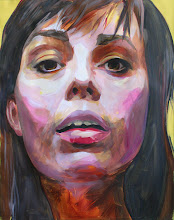 I've recently picked up "Seven Days in the Art World" by Sarah Thornton - I've been looking forward to reading this for a while and finally was able to get it from the library. So far I've read the Intro and the chapters on The Auction and The Crit. I found the one about the Crit fascinating as I love the idea behind critiques however, in actuality find them questionable valuable.
I've recently picked up "Seven Days in the Art World" by Sarah Thornton - I've been looking forward to reading this for a while and finally was able to get it from the library. So far I've read the Intro and the chapters on The Auction and The Crit. I found the one about the Crit fascinating as I love the idea behind critiques however, in actuality find them questionable valuable. A bit of the chapter discusses different perspectives on a critique- what is useful, what is not; some teachers of MFA programs use a crit to dig deep into the work and challenge the artist to defend themselves, their work and their ideas. Others use it for the artist to listen to what their audience/peers say about the work by not being able to respond. This also challenges the audience to really look at the work/text and as Mary Kelly says, it teaches them to read the work. "Ask yourself 'is this in the text or is this what I am bringing to it?'"
The chapter also delicately addresses the validity of MFA programs and the unfortunate hopes of the students for a ticket to success by receiving an MFA.
Here are a few things I've picked out. From the Introduction:
"Art is about experimenting and ideas, but it is also about excellence and exclusion."
From The Crit chapter: Legitimators of an Art Career:
MFA (better if from a top-ranking school)
Awards/residencies
Representation by a primary dealer
Features in art magazines
Inclusion in prestigious private collections
Museum validation in the form of solo or group shows, international exposure at well-attended biennials
Appreciation signaled by strong resale interest at auction
People often ask me what I hope to do with my art, especially people not involved in creative careers. I think people want to know if I hope to sell everything I make, or get it hung in a coffee shop, or if I make it for my own personal expression and don't care what happens to the actual artwork. I usually say I want to be a successful artist and to feel accomplished in my field, but what that looks like could be many things. I think the things listed above from "Seven Days" and describing them as "legitimators" is exactly what's in my head when I'm thinking about being successful and receiving some sort of recognition.
I think artists (especially young artists straight out of an MFA program) want recognition, but don't want to admit it. Or they think the are entitled to it and dismiss those that don't give it to them. I haven't met very many that will work for that recognition, but rather want to be discovered as brilliant rather than putting the work in towards being accomplished.
The chapter quotes Paul Schimmel, chief curator of the MCA Los Angeles: "Talent is a double edged sword. What you are given is not really yours. What you work at, what you struggle for, what you have to take command of, that often makes very good art."
One last point that I thought was interesting from this chapter was the discussion of the word creativity. Thornton's conversations with students at CalArts reflected their disgust with the word. They called it a "lovey-dovey cliche". Thornton then goes on to muse "Perhaps creativity is not on the agenda at art school because being creative is tacitly considered the unteachable core of being an artist?" I wonder if the students want to reject discussion about creativity for fear it would be revealed that they aren't creative.






No comments:
Post a Comment